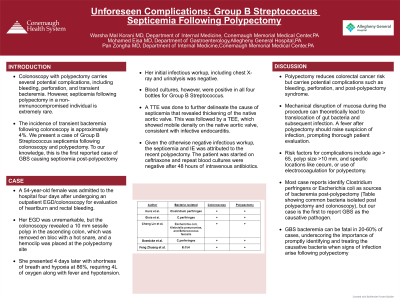Monday Poster Session
Category: Colon
P1998 - Unforeseen Complications: Group B Streptococcus Septicemia Following Polypectomy
Monday, October 28, 2024
10:30 AM - 4:00 PM ET
Location: Exhibit Hall E

Has Audio

Warsha Mal Korani, MBBS
Conemaugh Memorial Medical Center
JOHNSTOWN, PA
Presenting Author(s)
Warsha Mal Korani, MBBS1, Mohamed Eisa, MD2, Pan Zonghao, MD3
1Conemaugh Memorial Medical Center, Johnstown, PA; 2Allegheny Center for Digestive Health, Pittsburgh, PA; 3Temple University/Conemaugh Memorial Medical Center Internal Medicine, Johnstown, PA
Introduction: Colonoscopy with polypectomy carries several potential complications, including bleeding, perforation, and transient bacteremia. However, septicemia following polypectomy in a non-immunocompromised individual is extremely rare. The incidence of transient bacteremia following colonoscopy is approximately 4%. We present a case of Group B Streptococcus septicemia following colonoscopy and polypectomy. To our knowledge, this is the first reported case of GBS causing septicemia post-polypectomy
Case Description/Methods: A 54-year-old female was admitted to the hospital four days after undergoing an outpatient EGD/colonoscopy for evaluation of heartburn and rectal bleeding. Her EGD was unremarkable, but the colonoscopy revealed a 10 mm sessile polyp in the ascending colon, which was removed en bloc with a hot snare, and a hemoclip was placed at the polypectomy site. She presented with shortness of breath and hypoxia at 86%, requiring 4L of oxygen along with fever and hypotension. Her initial infectious workup, including chest X-ray and urinalysis was negative. Blood cultures, however, were positive in all four bottles for Group B Streptococcal.A TTE was done to further delineate the cause of septicemia that revealed thickening of the native aortic valve. This was followed by a TEE, which showed mobile density on the native aortic valve, consistent with infective endocarditis.Given the otherwise negative infectious workup, the septicemia and IE was attributed to the recent polypectomy. The patient was started on ceftriaxone and repeat blood cultures were negative after 48 hours of intravenous antibiotics.
Discussion: Polypectomy reduces colorectal cancer risk but carries potential complications such as bleeding, perforation, and post-polypectomy syndrome. Mechanical disruption of mucosa during the procedure can theoretically lead to translocation of gut bacteria and subsequent infection. A fever after polypectomy should raise suspicion of infection, prompting thorough patient evaluation. Risk factors for complications include age > 65, polyp size >10 mm, and specific locations like cecum, or use of electrocoagulation for polypectomy. Most case reports identify Clostridium perfringens or Escherichia coli as sources of bacteremia post-polypectomy, but our case is the first to report GBS as the causative pathogen. GBS bacteremia can be fatal in 20-60% of cases, underscoring the importance of promptly identifying and treating the causative bacteria when signs of infection arise following polypectomy
Note: The table for this abstract can be viewed in the ePoster Gallery section of the ACG 2024 ePoster Site or in The American Journal of Gastroenterology's abstract supplement issue, both of which will be available starting October 27, 2024.
Disclosures:
Warsha Mal Korani, MBBS1, Mohamed Eisa, MD2, Pan Zonghao, MD3. P1998 - Unforeseen Complications: Group B Streptococcus Septicemia Following Polypectomy, ACG 2024 Annual Scientific Meeting Abstracts. Philadelphia, PA: American College of Gastroenterology.
1Conemaugh Memorial Medical Center, Johnstown, PA; 2Allegheny Center for Digestive Health, Pittsburgh, PA; 3Temple University/Conemaugh Memorial Medical Center Internal Medicine, Johnstown, PA
Introduction: Colonoscopy with polypectomy carries several potential complications, including bleeding, perforation, and transient bacteremia. However, septicemia following polypectomy in a non-immunocompromised individual is extremely rare. The incidence of transient bacteremia following colonoscopy is approximately 4%. We present a case of Group B Streptococcus septicemia following colonoscopy and polypectomy. To our knowledge, this is the first reported case of GBS causing septicemia post-polypectomy
Case Description/Methods: A 54-year-old female was admitted to the hospital four days after undergoing an outpatient EGD/colonoscopy for evaluation of heartburn and rectal bleeding. Her EGD was unremarkable, but the colonoscopy revealed a 10 mm sessile polyp in the ascending colon, which was removed en bloc with a hot snare, and a hemoclip was placed at the polypectomy site. She presented with shortness of breath and hypoxia at 86%, requiring 4L of oxygen along with fever and hypotension. Her initial infectious workup, including chest X-ray and urinalysis was negative. Blood cultures, however, were positive in all four bottles for Group B Streptococcal.A TTE was done to further delineate the cause of septicemia that revealed thickening of the native aortic valve. This was followed by a TEE, which showed mobile density on the native aortic valve, consistent with infective endocarditis.Given the otherwise negative infectious workup, the septicemia and IE was attributed to the recent polypectomy. The patient was started on ceftriaxone and repeat blood cultures were negative after 48 hours of intravenous antibiotics.
Discussion: Polypectomy reduces colorectal cancer risk but carries potential complications such as bleeding, perforation, and post-polypectomy syndrome. Mechanical disruption of mucosa during the procedure can theoretically lead to translocation of gut bacteria and subsequent infection. A fever after polypectomy should raise suspicion of infection, prompting thorough patient evaluation. Risk factors for complications include age > 65, polyp size >10 mm, and specific locations like cecum, or use of electrocoagulation for polypectomy. Most case reports identify Clostridium perfringens or Escherichia coli as sources of bacteremia post-polypectomy, but our case is the first to report GBS as the causative pathogen. GBS bacteremia can be fatal in 20-60% of cases, underscoring the importance of promptly identifying and treating the causative bacteria when signs of infection arise following polypectomy
Note: The table for this abstract can be viewed in the ePoster Gallery section of the ACG 2024 ePoster Site or in The American Journal of Gastroenterology's abstract supplement issue, both of which will be available starting October 27, 2024.
Disclosures:
Warsha Mal Korani indicated no relevant financial relationships.
Mohamed Eisa indicated no relevant financial relationships.
Pan Zonghao indicated no relevant financial relationships.
Warsha Mal Korani, MBBS1, Mohamed Eisa, MD2, Pan Zonghao, MD3. P1998 - Unforeseen Complications: Group B Streptococcus Septicemia Following Polypectomy, ACG 2024 Annual Scientific Meeting Abstracts. Philadelphia, PA: American College of Gastroenterology.
